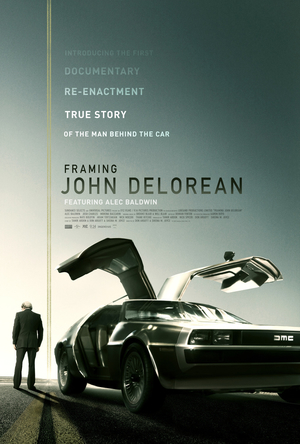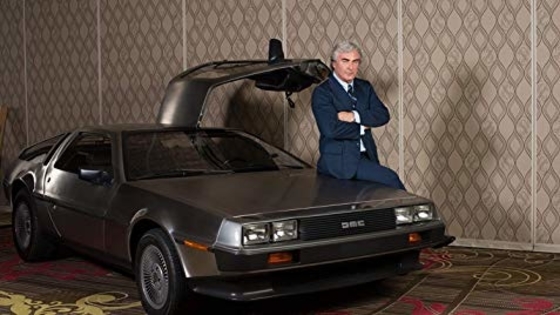

[Rating: Minor Rock Fist Up]
In 1941, Orson Welles allowed audiences to explore the life of a man who had it all and lost it all in Citizen Kane. In the film, the complications in telling the story of one’s life was compared to a jigsaw puzzle. With this comparison it is famously stated at the end of the film “I don’t think there’s one word that can describe a man’s life.” Many pieces create the puzzle of life, but completion looms over it all as an impossible task.
Seventy-eight years later, Sheena M. Joyce and Don Argott attempt to put together their own convoluted puzzle. Instead of examining the life of a newspaper tycoon, Joyce and Argott turn to the world of automobiles, and the visionary who took things to high speeds but crashed harder than any imagined possible.
In a similar vein to Welles, Framing John DeLorean plays with the idea of the difficulty in telling an accurate story of one’s life. Both films have similar implications on the impossibility of the feat, however Joyce and Argott’s film marvelously relates these ideas to the meta-cinematic. In a hybrid style of documentary filmmaking consisting of talking heads, behind the scenes’ footage, and re-enactments, Framing John DeLorean not only attempts to tell the story of John DeLorean’s rise and fall, but also ironically explains that his story cannot be properly explained.
Though confusing in premise, the film succeeds through its self-awareness. In owning the contradictions in the attempted experiment, credibility is given to the film. Instead of pointing fingers at Joyce and Argott for their hypocrisy, we are left pointing the finger at other documentaries and biographical films that were not upfront about their inability to paint a perfect picture.
In addressing the issues of filmmaking, specifically with the story of John DeLorean, different anecdotes are presented about the copious amount of failed attempts in making a film about DeLorean’s life. One humorous story which sticks out is from Alec Baldwin who plays John DeLorean in the re-enactments in this film, claiming that DeLorean called him earlier in his career and asked if he would play him in a biopic that was in the works at the time.

In Joyce and Argott’s attempt at telling DeLorean’s story they begin at his time as a creative engineer at General Motors. DeLorean’s strong will and passion took him to great heights in the car business, but it was also this do-whatever-it-takes drive that ended up taking everything away from him. In the film’s unique style and set up, there were segments of interviews with historians, filmmakers, and individuals from DeLorean’s life, then behind-the-scenes footage of actors preparing for their roles, and then finally the re-enactments.
What makes Framing John DeLorean so compelling is how blurred the moral lines are for DeLorean and his motives. While there are times he brought good into the world through his innovation and ability to supply much-needed jobs, there are also instances of him doing inherently bad things. The film and the individuals interviewed build different potential cases on why John DeLorean did what he did, leading to his arrest, but even more importantly why John DeLorean was the way that he was.
Justification for DeLorean’s actions are established by some of the talking heads, claiming he was delusional through his dreams, and his willingness to succeed at all costs. At the same time, the film brilliantly includes pathos-driven interviews from DeLorean’s now-grown children who don’t care about why he did his actions, but why he was willing to risk losing them in his bid to achieve his goals. The interviews where John’s son Zachary DeLorean doesn’t seem to know what to make of his father are especially emotional and add to the complexity on trying to piece together John’s life. It even leaves to the end of the film, where Zachary explains how he thinks his father’s story should end, opposed to how it ended in real life.
The hybrid style of the film flows well for the most part. Capturing the different insights from the individuals involved and the actors themselves establishes an impressive narrative of the mystery of DeLorean’s life. As the film’s title alludes to with defining his life, it’s about how DeLorean is “framed” not how the facts are cited. This raises questions on the suspicious nature of his arrest and if he was always destined to lose in the court of public opinion, due to the media’s presentation.

The blunder of the film however is the painfully acted re-enactments. It’s fascinating to see video of the actors preparing themselves, but once the scenes are shown it’s almost always abysmal. If the intended purpose was to have the re-enactments be as authentic as possible, it still missed the balance of having energy in the honesty.
The re-enactments have the very off-putting combination of feeling both forced and stale. Baldwin has little to no charisma in his portrayal in an exciting story that needed a lot of it. In what was a very clever idea with the self aware re-enactments, the delivery just wasn’t what it should have been. The hybrid style had the potential to make the film standout as one of the best and most interesting documentaries of the year, however the dull re-enactments hinder it greatly.





Comments on this entry are closed.